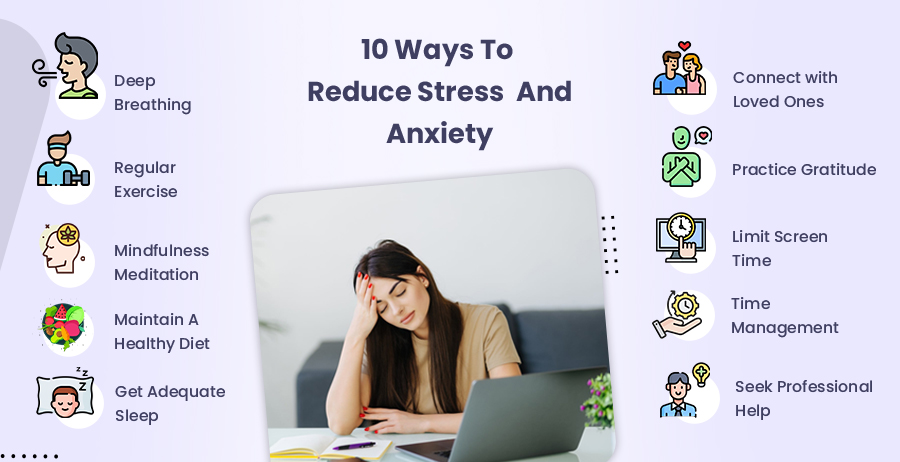Table of Contents
10 Ways to Reduce Stress and Anxiety
The fast-paced world we live in today makes stress and anxiety more prevalent.
Whether it’s due to work pressures, personal problems, or the demands of modern life, finding effective ways to alleviate stress and anxiety is crucial for our mental and physical well-being.
Fortunately, there are simple yet highly effective techniques that can help you manage and reduce these overwhelming feelings.
In this article, we will explore the 10 Ways to Reduce Stress and Anxiety in your daily life.
10 Ways to Reduce Stress and Anxiety
1. 🌬️Deep Breathing
One of the most immediate and effective ways to reduce stress and anxiety is through deep breathing.
Deep breathing exercises are a fundamental relaxation technique that can be done almost anywhere, at any time.
The key to deep breathing is to focus on your breath and take slow, deliberate breaths.
Take some time to find a quiet, comfortable spot to sit or lay. Close your eyes and take a deep breath through your nose, counting to four as you inhale.
Exhale slowly for a count of four after holding your breath for another four counts. Repeat this process several times.
2. 🏋🏻♂️Regular Exercise
Exercise is a well-documented stress reliever. Engaging in regular physical stamina not only benefits your physical health but also plays a significant role in managing stress and anxiety.
When you exercise, your body releases endorphins, natural mood boosters. These endorphins help reduce stress, enhance mood, and improve overall mental well-being.
Exercise doesn’t have to mean hitting the gym for intense workouts. Even a brisk 30-minute walk, a yoga session, or dancing to your favorite music can have a positive impact on your mental state.
3. 🧘🏻♀️Mindfulness Meditation
Mindfulness meditation is a powerful practice that can help you regain control over your thoughts and emotions.
This technique involves paying deliberate attention to the present moment and observing your thoughts, feelings, and bodily sensations without judgment.
By focusing on the “here and now,” you can break the cycle of worrying about the past or the future, which is often a source of anxiety.
To start, find a quiet place to sit or lie down. By closing your eyes and breathing deeply, you can relax.
4. 🥗Maintain a Healthy Diet
The quality of your mental health is strongly influenced by your healthy diet.
A diet rich in whole lean proteins, vegetables, fruits, and grains, provides essential nutrients your body needs to cope with stress.
These foods can help stabilize your blood sugar levels and prevent mood swings.
Conversely, excessive consumption of caffeine and sugary snacks can contribute to feelings of anxiety and stress.
These substances can lead to energy spikes followed by crashes, which can exacerbate stress and anxiety.
To manage your stress and anxiety levels, consider reducing your intake of caffeine and sugary foods while focusing on a balanced and nutritious diet.
5.🛌 Get Adequate Sleep
Lack of sleep can have a profound impact on your stress and anxiety levels. When you don’t get enough rest, your body and mind become more vulnerable to stress.
Sleep is essential for the body’s natural stress recovery process, and it helps regulate mood and emotions.
To ensure you get a good night’s sleep, establish a regular sleep schedule by going to bed and waking up at the same time each day.
6. 💌Connect with Loved Ones
Anxiety and stress can be effectively managed with social support. Spending time with friends and family, sharing your thoughts and feelings, and seeking support can be incredibly comforting.
Knowing that you have a support system can help reduce feelings of isolation and loneliness, which are often associated with stress and anxiety.
When you talk to someone you trust, you not only share your concerns but also gain a different perspective.
You can achieve a restful night’s sleep with Zopisign 10mg, promoting improved sleep quality and overall well-being.
7. 😅Practice Gratitude
Practicing gratitude involves recognizing and appreciating the positive aspects of your life.
It is a simple yet effective way to shift your focus away from stressors and toward the good things surrounding you.
Keeping a gratitude journal is a popular method for practicing gratitude. Make a habit of writing down three things you are grateful for every day.
It doesn’t matter how big or small, how personal or universal they are. By acknowledging the good things in your life, you can reframe your perspective and lower your stress levels.
8. 🖥️Limit Screen Time
In our digital age, it’s easy to get caught up in the constant stream of information and notifications from our smartphones, tablets, and computers.
Excessive screen time can contribute to feelings of stress and anxiety. The blue light emitted by screens can interfere with your sleep patterns and make you more agitated.
9. 🕒Time Management
One of the common sources of stress and anxiety is feeling overwhelmed by tasks and deadlines. Poor time management can lead to a sense of chaos and helplessness.
To regain control of your schedule, it’s essential to develop effective time management skills. Your first step should be to create a to-do list and prioritize your tasks.
Break larger projects into smaller, more manageable steps, and allocate specific time slots to work on them.
With Zopisign 7.5mg, you can manage insomnia and wake up feeling refreshed and ready to face the day.
10. 👨🏻⚕️Seek Professional Help
If your stress and anxiety become overwhelming and interfere with your daily life, it’s essential to seek professional help.
A mental health counselor or therapist can provide you with strategies and support tailored to your specific needs.
There’s no shame in seeking help when you need it, and it can be a crucial step in managing and reducing stress and anxiety.
✍Final Words
Stress and anxiety are common challenges in our fast-paced world, but they are not insurmountable. By incorporating these 10 simple strategies into your daily routine, you can effectively manage and reduce stress and anxiety.
Remember that everyone is unique, and what works best for one person may not work for another, so don’t be discouraged if you need to experiment with different techniques.
The key is to take proactive steps towards a healthier, more balanced life, and with time and effort, you can find the stress relief that works best for you.





